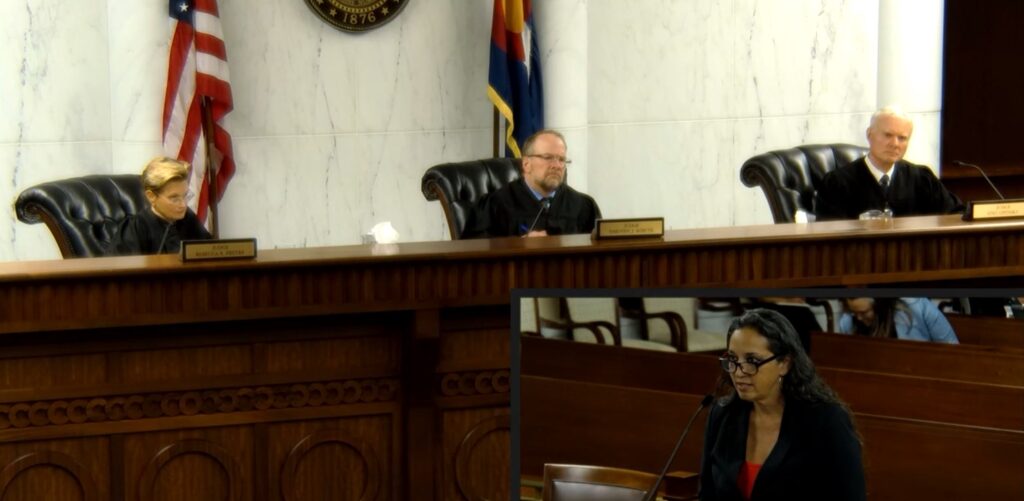By Jeffrey A. Roberts
CFOIC Executive Director
Colorado’s second-highest court Thursday ordered a judge to hold a hearing in the case of a “homeless and penniless” activist who sued a state agency that wanted to charge him $600 for copies of ketamine waivers.
Denver District Court Judge Kandace Gerdes last year dismissed Frank Sturgell’s Colorado Open Records Act lawsuit against the Department of Public Health and Environment without convening a hearing, ruling he did not have legal standing to bring his claims because he hadn’t “alleged personal injury.”
But the Court of Appeals disagreed, writing in an opinion that the district court “did not explain the rationale for its conclusion.”

“Given the broad protected interest in obtaining public records, and the express policies that underlie that interest, we conclude that Sturgell asserted facts that, if established at a hearing or trial, would support the conclusion that he suffered injury in fact to a legally protected interest,” the opinion says.
The appellate judges told Gerdes to conduct a hearing on the “asserted reasonableness of the estimated $600 fee and corresponding deposit” and whether Sturgell provided the health department 14 days’ notice before filing his lawsuit, as CORA requires. “If the court concludes Sturgell does not have standing, the CORA claims must be dismissed. If the court concludes that Sturgell has established standing, the court may address the merits of the CORA claims, subject to any defenses that may be asserted.”
Sturgell in court filings stated he was “homeless and penniless” in 2020 when he made CORA requests for copies of ketamine waivers issued by the health department’s Emergency Medical Practice Advisory Council and couldn’t afford the estimated fee to pull and review 50 two-page records. He considered the fee “not reasonable” and a denial of the records, “a blocking attempt regularly used by government agencies to avoid disclosure of public documents.” (Sturgell told the court he asked for the waivers because of the 2019 death of Elijah McClain in Aurora police custody following an injection of ketamine by paramedics.)
The health department “should have been able to provide the ketamine waivers with the click of a button,” within the free first hour of research and retrieval required by CORA, contended a brief filed by Sturgell’s attorney, Anita Springsteen. Instead, the agency told Sturgell that producing the records would take 20 hours, billed at $30 an hour.
During oral arguments before the Court of Appeals in July, Assistant Attorney General Haar Katta defended the judge’s dismissal of Sturgell’s lawsuit, saying Sturgell hadn’t been denied public records. “After the initial request, the department responded by noting the $600 fee that is permissible under CORA. And then, rather than paying the fee, Sturgell abandoned the request. He walked away from it,” Katta said.
But rather than dismissing the case without a hearing, Gerdes “was “obligated to accept Sturgell’s allegations as true for purposes of resolving whether Sturgell had standing to pursue his CORA claims,” the Court of Appeals ruled.
“There is not an abundance of case law addressing the standing requirements for asserting a CORA claim,” but the statute broadly states “that all public records shall be open for inspection by any person,” unless a statutory exception applies, the appellate judges noted. The Colorado Supreme Court interpreted this language in 1974 as eliminating “any requirement that a person seeking access to public records show a special interest in those records in order to be permitted access thereto.”
The Court of Appeals affirmed Gerdes’ decision to dismiss other allegations made by Sturgell, including that the Emergency Medical Practice Advisory Council was not legally created.
The judges’ opinion also admonishes Sturgell and Springsteen for the “tone and tenor” of Sturgell’s court briefs, which they wrote are “replete with inflammatory and conclusory allegations that are irrelevant to the issues presented.”
Springsteen told the Colorado Freedom of Information Coalition she is “a bit embarrassed that the court thought I had ‘inflammatory language’ in my appeal. “This has been a four-year project with NO PAY,” she wrote in an email. “Trying to fit it in between paying the bills. Frank gave me drafts of things to help, and I would go through it and try to fix everything and write it to my own standards. But as the court alludes, it was 228 paragraphs of facts and such. It was an overwhelming amount of information, there were likely things I missed or didn’t have time to perfect my language … I will certainly carefully watch my tone in future filings.”
Overall, Springsteen added, she believes the Court of Appeals ruling “will help to send the message that government entities may not get away with withholding records for years on end.”
Follow the Colorado Freedom of Information Coalition on X (formerly Twitter) @CoFOIC. Like CFOIC’s Facebook page. Do you appreciate the information and resources provided by CFOIC? Please consider making a tax-deductible donation.




